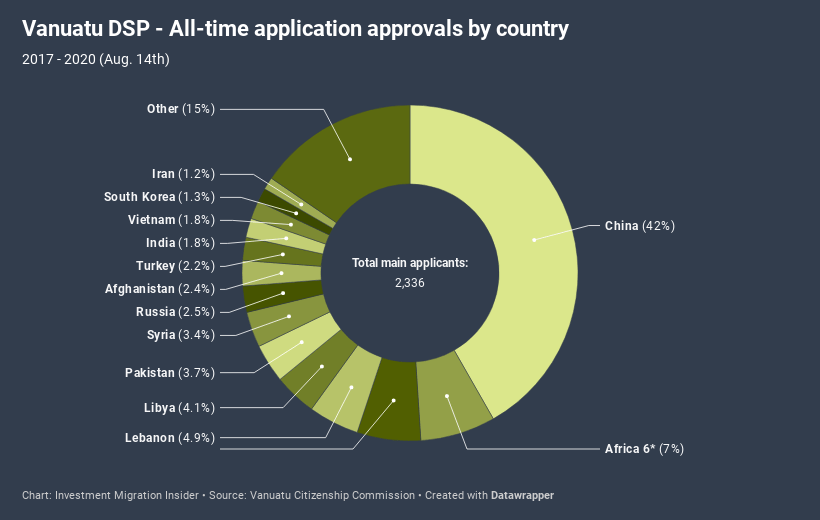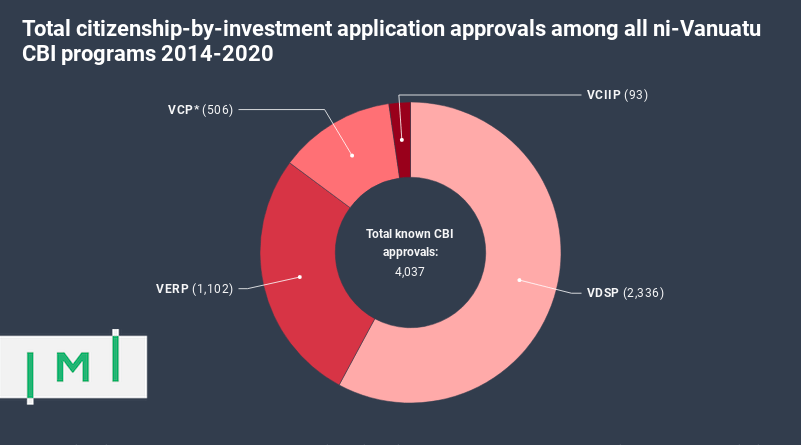IMI EXCLUSIVE: Vanuatu Reveals Historical Data on All CBI Programs Going Back to 2014
In a historic data release prepared exclusively for IMI, Vanuatu’s Citizenship Commission shares, for the first time, detailed statistics on all four of its past and present citizenship by investment programs.
Upon taking the helm as Chairman of the Vanuatu Citizenship Commission earlier this year, a series of formidable tasks faced Ronald Warsal. Over the last six years, his country’s previous governments had operated no fewer than four separate citizenship by investment programs, none of which had readily available statistics in digital form; mainstream journalists, industry observers, and foreign governments expressed concerns over the lack of transparency and about the program’s apparent inconsistencies. The incoming government ordered a comprehensive review of the various programs, promising to streamline existing procedures, reduce opacity, and terminate any sweetheart deals entered into by previous administrations.

That review is now well underway and, under the aegis of Chairman Warsal, the Commission has today taken a major step toward engaging the investment migration community and demonstrating its commitment to transparency.
After weeks of open dialogue with IMI and its affiliates, the Commission has provided a raft of hitherto-unseen data on all four of its programs.
The VDSP data
The most detailed data available related to the Vanuatu Development Support program, which officially launched in 2017. Between its inception and August 14th this year, a grand total of 2,336 main applicants received approvals for their CBI applications.

Of these, 333 stem from 2017, 445 from 2018, 1,182 from 2019, and 376 from this year to August 14th. By far the greatest group of nationals are the Chinese, who accounted for 42% of the total since 2017, followed by the “Africa 6” (The dataset provided to IMI reports six African countries – Nigeria, Ghana, Guinea, Guinea-Bissau, Ethiopia, and Kenya – as a single unit, the preponderance of which we understand to be composed of Nigerians) at 7%, Lebanon at 4.9%, Libya at 4.1%, and Pakistan at 3.7%.
The data on VCP, VERP, and VCIIP
The Commission also confirmed the Vanuatu Contribution Program (VCP) application approval figures for 2017 and January 1st to August 14th, 2020, although not for 2018 and 2019. In 2017, 177 main applicants received approvals under the VCP, while 329 have been approved so far in 2020.
While the VDSP has 87 accredited agents, the VCP is a program operated exclusively by a single company, a much-criticized arrangement entered into by the former government of Vanuatu and one whose continued existence is far from guaranteed. Under the original agreement, the VCP alone was permitted to market ni-Vanuatu citizenship by investment in the Greater China region (which raises questions as to how Chinese applicants make up the plurality of DSP applicants).
Altogether 1,102 main applicants were approved under the Vanuatu Economic Rehabilitation Program (VERP), a CIP that operated in 2015 and 2016. Under this program as well, Chinese investors made up the lion’s share of applicants (58%), followed by Iraqi (19%), Syrians (8%), Libyans (5%), and Turks (3.6%).
IMI has also learned that, in 2014, under the Capital Investment Immigration Plan (CIIP), 93 applications were approved, 92 of which came from Chinese applicants and one of which from a Thai investor.
Aggregating the data, we find that – for all four programs combined – at least 4,037 investors have received citizenship in Vanuatu since 2014 under one of its CBI programs. This total figure, however, does not include VCP approval data for the years 2018 and 2019, both of which were – according to CBI revenue figures from Vanuatu’s Treasury – record years. The true total, therefore, is likely closer to 5,000, if not more.
Responding to questions from IMI regarding what concrete plans the government had for expanding the program to include investment options like real estate, as well as what would become of the VCP, Chairman Warsal explained he could not say much until the ongoing program review process had concluded. He did, however, offer a few numerical highlights:
- The average number of dependents under the VDSP in the last two years has been below one.
- The top 10 VDSP agents accounted for 384 submitted applications (about a third of the total, indicating agents are performing according to a normal distribution).
- The Citizenship Commission itself had not rejected any applicants because rejections take place at stage one of the due diligence process, which is conducted by the Financial Intelligence Unit. IMI understands that rejection rates at the FIU are around 4%.
Commenting on today’s data release, Peter Vincent – a globally recognized security analyst, former senior official with the Obama administration with a background in BORDERPOL, Thomson Reuters, Henley & Partners, and the Department of Homeland Security – welcomed Chairman Warsal’s overture but modulated it by indicating there was more work to be done.
“This is a revealing Q&A and accompanying set of figures,” said Vincent. “Following on the heels of the Chairman’s recent press statement, it looks like a serious effort by Vanuatu to convey its recognition of the urgency for the Citizenship Program to become more transparent and to seek compliance and due diligence standards that meet international norms and expectations. We now have some historical context, but the hard question is ‘what’s next?’. There is mention of a current government review and this should hopefully lay the foundations for future program modifications. Consultations with international RCBI industry stakeholders, especially due diligence providers, are imperative so that peer-learning is enabled and best practices incorporated into any program revisions”.
Christian Henrik Nesheim is the founder and editor of Investment Migration Insider, the #1 magazine – online or offline – for residency and citizenship by investment. He is an internationally recognized expert, speaker, documentary producer, and writer on the subject of investment migration, whose work is cited in the Economist, Bloomberg, Fortune, Forbes, Newsweek, and Business Insider. Norwegian by birth, Christian has spent the last 16 years in the United States, China, Spain, and Portugal.



